A food writer is not Aesop and should avoid telling a tale that has a moral.
I have nothing against morals personally, but if a food writer should go off on a tangent explaining how she wandered stupidly into danger, had to fight off a marauder and run for her life, the column won’t be about how to cook chicken.
I am going to tell you a story. It’s a true story. And even though the story must end with a moral, it also has pork and beans.
My tale begins in London in the spring of 1967. I had flown the pond from Houston to Heathrow because my AFTRA contract (American Federation of Television and Radio Artists) said I was expected to perform for one month at London’s Playboy Club.
Working as a professional singer for a couple years, I played clubs across America, but this was my first gig overseas.
A cab took me from the airport to 45 Park Lane. Located across from The Dorchester Hotel and overlooking Hyde Park in the heart of London’s Mayfair district, the Playboy Club was in a prime position to draw the swells into its den of bunnies, booze, comedy, music and gambling. A dinner menu that was limited to various cuts of steak was also available, but no one ever ate except Americans.
Historically, by the end of the 1960s the nightclub era was down to its last gasping breath. With the coming of the Beatles, the Rolling Stones and the big noisy arena-sized blast of rock and roll, the intimate cabaret scene was becoming the entertainment world’s dodo bird.
I was out there singing at the tail-end of the dinner club’s elegant and sophisticated milieu. In London I did three shows a night, six nights a week. My 30-minute repertoire was called “the opening act.” After I finished warbling and floated off stage to a modest bit of clapping, a headliner comedian came on to thunderous applause and spent the next hour laying them in the aisles.
The 45 Park Lane building not only housed the four-story club – open only to members with Playboy keys – but also had a few efficiency apartments that were used to lodge entertainers. The apartment assigned to me had just been vacated by the ragtag, slightly insane comedian Professor Irwin Corey.
The nutty professor had left it in a mess. The maid service tried their best, but even the most fastidious housecleaner would have difficulty camouflaging the stale cigar smell and removing “Greetings from Irwin” that was etched with penknife into the toilet seat.
It was a very small apartment with the tiniest of mini kitchens. The refrigerator was the size of a hat box, and there was a hot plate for cooking. I found two small pots on the counter, a can opener, one plate, one coffee cup, one fork, one knife and one spoon.
The first week I ate my meals at the club. But since food from the Playboy kitchen wasn’t free, the expense began to put a sizeable dent in my paycheck.
Deciding that some shopping must be done so that I could use the pitiful hot plate to cook maybe canned pork and beans or canned chili, I looked forward to Saturday and a day spent wandering the food markets that I’d been told were within walking distance.
I also looked forward to dressing casual. Formal gowns were great, but this was the 60s, and I was young and wanted to wear something groovy for my first appearance on London’s public streets.
I chose a red-and-white checkered, flared-leg pants suit with matching red-and-white checkered fedora. Climbing into a pair of white go-go boots with three-inch heels, I went downstairs to ask the concierge for directions to the market.
From Park Lane I strolled over to Curzon Street to make the 10-minute walk to Shepherd Market. Perhaps the quaintest area in Mayfair, Shepherd Market still retained its narrow, winding streets that were originally used to drive sheep from the country into London.
Told I would find a series of individual shops – greengrocer, meat market, cheese market, bakery shop, liquor and wine – I went forward with a smile and a tote bag.
About five minutes into the walk I had a feeling something wasn’t right.
During the week I had observed Curzon Street from my apartment window and noted that it was a crowded circus of hustling humanity. Men in suits carrying the obligatory umbrella, ladies dressed for lunch or shopping, those funny black beetle-looking taxi cabs, noise, rush – on weekdays the sidewalks were bunched up with commerce and urbanity on the move.
That Saturday morning Curzon was deserted. Well, almost deserted.
Leaning against a building to my left was a woman dressed in fishnet hose, a red blouse that tried to be silk but wasn’t, a black skirt slit up to her thigh, a feathered hat and spiked red pumps.
On the sidewalk directly in front of me another woman leaned against a building. Wearing lime green shorts, again with the fishnet hose, and a skimpy something covering her breasts that looked like my father’s undershirt, she winked at me when I passed.
Looking back on the scene, I realize now that I did not realize then that these women were in the profession of leaning against buildings. Leaning, that is, until they could say “Hi, sailor” and get on with it.
Concerned that I was out on a street tarted up with tarts – but urgently in need of pork and beans – I went on.
Rattled and more than a bit nervous, I rounded a corner that led to Shepherd Market and bumped smack into a short, stubby man who was unshaven and smelled of cheese.
The man smiled – he had maybe five teeth, no more – and grabbed me. Talking very quickly and very loudly, he kept one hand on my arm and with his other hand pulled out a wad of money that didn’t look American.
His squeaky voice didn’t sound American either. He shoved the money at me. Horrified, I slapped it away. Then I started running.
Back down Curzon Street I sprinted. With the little man in hot pursuit, I ran past the floozies who gave me the raspberry, but cheered him on. I ran like a chicken spooked by a farmer wielding an axe, and I think cried out for my “Mama” at some point.
Swift as I loped along, he kept up the pace. Like a hound dog chasing after a possum, he stayed on my heels, shouting and waving money. Following me straight into the Park Lane apartment building, he was finally caught in a hammerlock by the doorman, kicked in the pants and told to go away or the bobbies would be called.
With my cute hat pulled down over my eyes like a gangster, I stormed upstairs to see the manager of the Playboy Club. A mixture of mad and frightened roiled inside my hungry stomach. Very near tears or an act of murder, I demanded to know what had just happened to me down on the streets of Merrie Olde England.
“Probably was a Greek sailor,” the manager said. “Could have been a Russian, or maybe an Albanian. Saturday on Curzon Street is when the sailors come in and the prostitutes come out. It’s traditional. Been a tradition since around the 17th century.”
He paused, then gave me a squinty eye. “Why were you down there loitering around?”
“I needed pork and beans,” I said.
Now for the moral. It doesn’t matter where you are – it doesn’t matter what part of the world you find yourself in, whether exotic port or kingdoms of unparalleled culture and civilization – do your grocery shopping on Tuesdays.

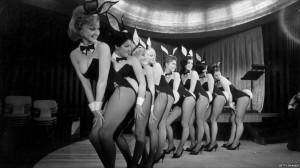

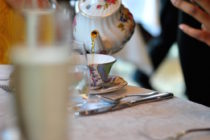
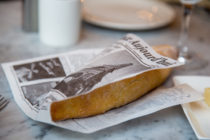


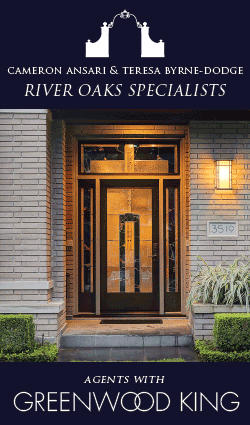
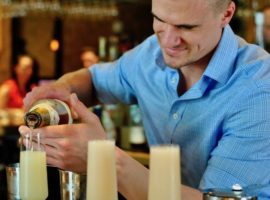
Follow Us